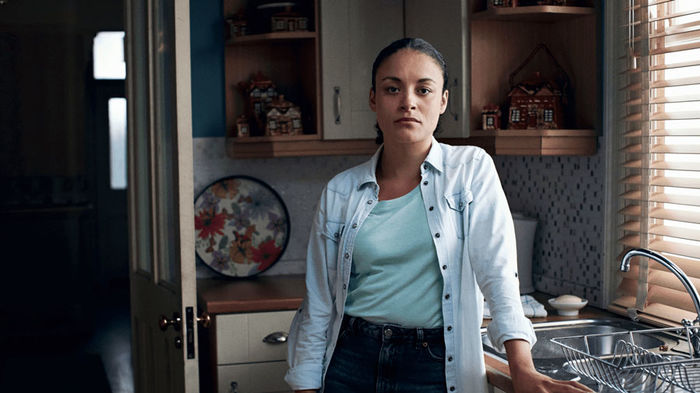From Screen to Stage: Alan Bennett’s The Outside Dog and The Hand of God
Sophia Till reviews two monologues from Alan Bennett’s acclaimed Talking Heads series, which were filmed for television in 2020 and later performed on stage at London’s Bridge Theatre.
The Outside Dog and The Hand of God sit unsteadily between past and present, the ‘then’ and the ‘now.’ A pair of monologues revived from Alan Bennett’s 1998 Talking Heads series, they were filmed for television this summer and brought to London’s Bridge Theatre in the autumn. The Hand of God, performed by Kristin Scott Thomas, is like unearthing a time capsule, sepia-tinted and of its time – vintage Bennett at its finest. The Outside Dog, starring Rochenda Sandall is its opposite; modern Bennett – in its rawest form. Scott Thomas’s charm and chintz-cloaked wit contrasts Sandall’s terror in the face of her psychopathic, slaughter-man husband. The Hand of God is nestled comfortably in memory, with Scott Thomas revelling in nostalgia, while Sandall forcefully drags Bennett’s work into 2021.
On the screen in The Outside Dog, a bare kitchen sets the scene. On the stage, there is just a sink and a small worktop. There is only one thing to look at: Sandall, who plays Marjory, a woman with an Obsessive-Compulsive Disorder, living under the same roof as a murderer. The backdrop exudes the mundane, the ordinary, the banal, yet Sandall’s electrifying performance is anything but. In a distressing depiction of a woman whose husband has been charged with the murders of several women, Marjory is frightfully vulnerable. All at once defenceless and defensive, she is conflicted between being a victim and being a wife. Paralyzed by fear, she acts –unbeknownst to him – as an accomplice, hiding the evidence that would have declared him guilty.
“Sandall forcefully drags Bennett’s work into 2021.”
The stripped set leaves Sandall exposed – a physical manifestation of Marjory’s emotional state. This haunting coldness extends to Jon Clark’s lighting, which glares upon Sandall, who could not seem more alone in the centre of the stage – something you miss on screen. It’s intimidating. Unprotected, there is a coyness of Sandall that speaks to Marjory’s unspoken coping mechanisms – a lingering humour, that was captured also by Julie Walters in the monologue’s first screening. Perhaps a unifying thread between past and present, it looks to the unchanged nature of domestic abuse, and the vulnerable women shut behind many a locked door. Yet Sandall is also bold and hard-nosed, a courageous tour de force who gives a voice to the silent sufferers, and allows audiences an insightful look into the disturbing nightmares of the everyday.
The Hand of God couldn’t be more different. Set between the four walls of an antique shop, Celia is a snobbish and self-satisfied woman stuck in the past. Scott Thomas sits poised at a table for the entirety of the performance, in stark contrast to Sandall’s dynamism and intensity. A respectable older woman, she looks down her nose at most things, being particularly blasé about younger, up-and-coming art dealers – namely the folks at Sotheby’s and Christie’s. This will soon become a sticking point for Celia and her unfounded opinions, with which she tries to mask her shame – all rather transparently I hasten to add. Hiding her story amongst the tit-bits and busybodies of quaint country life, Celia is all at once smug, abashed and embittered. Her shop houses enough irony, wit and cynicism to bring laughter and tears simultaneously. Quite frankly, you don’t know whether to laugh or cry at the plot’s punchline. Scott Thomas is sharp, quick and proud at the monologue’s beginning, but she marvellously transforms into unbegrudging embarrassment and reluctance. Some may argue that this performance is substandard work for Scott Thomas, but truthfully, this might just be one of her best.
Undoubtedly, both performances are exceptional. On the screen you have the ability to pick and choose between episodes – to play, to pause, to stop. At the theatre, Rochenda Sandall opens the production and Kristin Scott Thomas closes it. Side by side, there seems to be an unsettling disjuncture. Audiences are taken from the heights of despair and desperation to refined ramblings of a Home Counties widow. The Outside Dog leaves you feeling empty, and despite all of its brilliance, The Hand of God does not entirely restore the contentment you had upon entering the theatre.
 News / SU reluctantly registers controversial women’s soc18 December 2025
News / SU reluctantly registers controversial women’s soc18 December 2025 News / CUP announces funding scheme for under-represented academics19 December 2025
News / CUP announces funding scheme for under-represented academics19 December 2025 Features / Should I stay or should I go? Cambridge students and alumni reflect on how their memories stay with them15 December 2025
Features / Should I stay or should I go? Cambridge students and alumni reflect on how their memories stay with them15 December 2025 Fashion / The art of the formal outfit 18 December 2025
Fashion / The art of the formal outfit 18 December 2025 Lifestyle / Summer lovin’ had me so… lonely?18 December 2025
Lifestyle / Summer lovin’ had me so… lonely?18 December 2025









